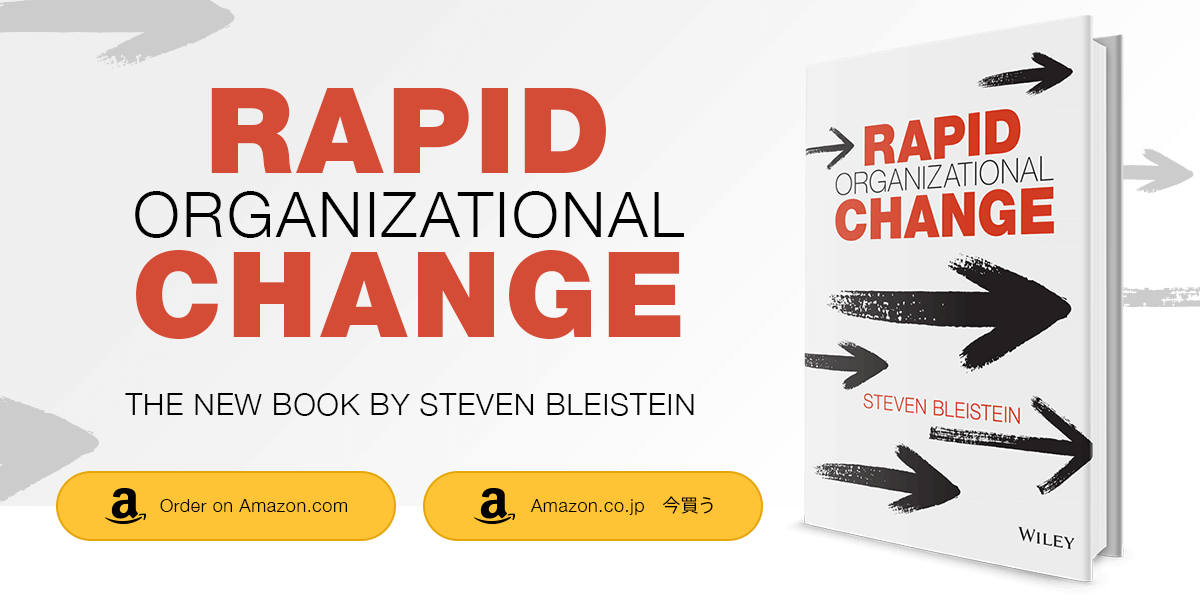[:en]
For many companies in Japan, markets and strategic priorities have changed faster than the way senior sales staff do things. The target customers, industries, ways of selling and delivering value must change if the company is to thrive. Yet so many CEOs of companies in Japan lament about senior salespeople who cling to the past. This includes Japanese leaders of Japanese companies, not just non-Japanese leaders of non-Japanese companies.
While fears are frequently exaggerated or unfounded, CEOs often hesitate to push too hard, as they don’t want to damage important relationships with key customers which they view as owned by the salesman. At the same time, it is impossible to address change among junior sales staff while senior sales staff is recalcitrant. Efforts at training junior staff are doomed to fail. And so we are at an impasse, where improving on current ways yields little in terms of results, and doing things in a new way is impossible.
I have written before that performance gaps have only three causes:
- I don’t know how to…
- I don’t want to…
- Even if I wanted to, I can’t!
Number One is addressed by teaching people “how to…” Number Three is about removing structural impediments. However, it is Number Two that is the hardest to address because neither teaching nor restructuring processes address the cause. The senior salesman who won’t change is frequently a “don’t want to” problem, and to address it you must understand the motivation.
Many senior salespeople in Japan have built their careers through experience and building a network of relationships with customers. They view their value in terms of the customers they know, and their familiarity with an industry. Many sales organizations in Japan do little in terms of training. Few have any formal sales methods or processes. Junior salespeople are expected to learn only by imitating those who have gone before them. As such, the senior salesman also views his value not so much in that he knows sales process, but rather that he IS the sales process.
However, the reality is that sales not merely a network of contacts, but rather a profession, and a noble one at that!
There are principles, methods, and practices that work regardless of the product or industry. Click To Tweet
A competent sales professional is capable of being in successful in any industry, and you have likely met good salespeople who have worked in many different sales roles successfully.
A strategic change that makes an imperative of selling into new industries and markets, developing prospects from scratch, and selling new types of products and services can be highly threatening to a senior salesman who sees his entire value as based on who he knows now, what he sells now, where he sells it now, and how long he has been doing the same. All at once, he sees the edifice of his career built up over decades as razed. His network is no longer valued. His industry and product knowledge is no longer relevant. His ways are no longer the paradigm for all those junior to him.
His informal status suffers a demotion. In fact, he may view himself as suddenly lowered to the same level as freshman sales staff with a clean slate, only his slate of course has been wiped. Now he must learn and advance anew like the others, only he may be closer in years to retirement than they may be in years spent in the company. Who would not feel threatened?
A frightened senior sales person may have value of which he or she may be unaware. Practices that they may have considered industry or product specific may be applicable elsewhere. These can be brought out and documented for others to learn from. More importantly, a senior salesman has a possible leadership role. He is already viewed as a paradigm. More junior sales people will still look to him for guidance. However, the paradigm of behavior should be one of openness to learning new things, taking risks and going for new opportunities, and not letting fear of failure get the better of you.
A senior salesman need not see the edifice of his career razed, but he does need to renovate. You can help with that. Start by working with the senior sales staff and sales managers first before attempting to train all staff together. Build sales principles, processes, tools, and methods together with the leaders first. Document the sales methodology so it can be shared, taught and improved. Decide with the leaders together how to roll out the new methodology to staff, how to teach it, how to hold staff accountable for using it, and how to practice and improve it regularly. Make the senior sales leaders partners in change strategic change, whether managers with staff or informal leaders to whom others look up because of seniority. Address the “I don’t want to” concerns in this way.
Not every senior salesman will want to change despite your best efforts to appeal to his self-interest. That cannot be helped. However, in my experience, most will change if approached in the way I described above. This gives you your best option, which is certainly better than simply giving up on your veteran sales staff, or compromising strategic objectives.
ここのところの市場や戦略の優先順位の変化のスピードは、日本の多くの企業における上級営業スタッフの仕事のやり方の変化を上回るものでした。企業がずっとうまくやっていくためには、ターゲットとなる顧客や産業、売り方や価値の供給方法も変化する必要があります。しかしながら、会社社長の方々は、よく過去にしがみつこうとするベテラン営業担当者のことをこぼされています。これは外資系企業の日本人以外のリーダーだけでなく、日本企業の日本人リーダーにも見られる傾向です。
企業の社長は、重要な顧客との関係は営業スタッフが築き上げてきたものであり、それを壊すのが怖いがために(この恐れは誇張されたものであったり、事実無根であったりすることが多いのですが)、営業のやり方の変更を強要することを躊躇するきらいがあります。同時に、上級営業スタッフが変化を拒んでいる間は、若手営業スタッフにそれを実行させることは無理です。そのような環境で若手営業スタッフをトレーニングしても、失敗するのは目に見えています。つまり、現在のやり方はそのままで、改善だけ行っても大した結果は出ないし、新しいやり方を実践するのは不可能、という、行き詰まりの状態にぶち当たってしまうのです。
以前、パフォーマンスの格差が起こる原因はこの3つの中のどれかである、ということを書きました。
- やり方がわからない。
- やりたくない。
- やりたくでも、できない。
1番の場合、そのやり方を教えることで解決できます。3番の場合であれば、構造上の障害を取り除けば良いのです。しかし2番のケースはそう一筋縄ではいきません。教えたりプロセスを作り変えることで問題の原因に対処するということができないからです。変化を拒むベテラン営業スタッフの場合、問題は「やりたくない」というところにあり、これを解決するには、まずその動機を理解してあげなければなりません。
日本のベテラン営業スタッフの多くは、経験を重ね、顧客と良い関係を築き続けることで、キャリアを積んできました。彼らは、自分の価値は、自分の持つ顧客と業界の知識にあると考えています。日本の営業を行う企業には、大したトレーニングを行うところは殆どありません。正式な営業方法やプロセスを採用している企業もあまり見受けられません。新人営業スタッフは先輩のやり方を真似ることで営業を覚える、という文化なのです。ですから、ベテラン営業スタッフは、営業プロセスを知っている、というよりも、自分が営業プロセスそのものである、とも見ていると言った方がいいかもしれません。
しかし現実には、営業とは単なるネットワークの広さではなく、れっきとした特別な職種です。商品や業種、市場に関係なく通用する、営業独自の原理やメソッド、手法、言語も存在します。有能な営業のプロであれば、どんな業種においても成功します。きっとあなたご自身も、様々な営業の役目をうまくこなしてきた人に会ったことがあるでしょう。
ベテラン営業スタッフには、今自分が持っている知識、今販売しているもの、セールスを行っている場所、同じ仕事を行っている長さ、といったことに価値を見出している人が多くいます。彼らにとって、新しい業種や市場に入っていったり、見込み客をゼロから開拓したり、新タイプの商品やサービスを売り込むことは、かなり怖いことです。何十年もかけて作り上げてきたキャリアのシステムが突然崩れてしまう、と感じるわけですから。自分の人脈は無価値となり、業界、商品知識は関係ないものとなります。自分のやり方は、もはや後輩の模範とはなりません。
これは非公式に降格させられたようなものです。実際、自分は突然、新人営業スタッフと同じレベル、白紙の状態に引き下げられた、と思うかもしれません。いや、白紙の状態、というより、土台をもぎ取られた、という感じるでしょうか。今から他のスタッフと同じく新しいことを学び始めなければならないわけですが、これまで社で勤めた年数に比べ、退職までの年数の方が短い場合だってあるかもしれません。それは脅威を感じるのも自然なことです。
しかし、このように怯えているベテラン営業スタッフにも、自分では気づいていない価値があるのではないでしょうか。業界や製品独特のやり方と思われるものでも、外部で使えることもあります。そのようなものを分け合い、文書化して、他のスタッフが学べるようにすることもできます。さらに大切なのは、ベテラン営業スタッフは、リーダーシップの役割を負うことが可能であるということ。すでに模範となっているのですから、新人営業スタッフは、アドバイスを求め続けるでしょう。ここでは、新しいことを学ぶことや、リスクを負い、新しいチャンスを追い求め、失敗を恐れすぎない、といったことに寛容な姿勢を持って、模範となるべきです。
ベテラン営業スタッフは、自分のキャリアが崩れる、と考える必要はありませんが、革新を行うことは大事です。社長はそれに手を貸すことができます。まず、営業スタッフ全員をトレーニングする前に、ベテラン営業スタッフと営業マネージャーと幾つかのことに取り組みましょう。最初に営業リーダーの人々と共に、営業原理、プロセス、ツール、メソッドを作り上げてください。営業メソッドは書類化し、共有したり、教育に用いたり、改善ができるようにします。リーダー達とは、新しいメソッドをどのようにして社員に実行させるか、どうやって教えるか、実行する際にどのように説明責任を負わせるか、どうやって定期的に練習、改善ができるようにするか、などを一緒に考えましょう。上級営業リーダー(部下のいる営業マネージャーや、長年勤め、他から尊敬されている非公式なリーダーなど)は、この戦略的変化においてのパートナーにしてください。こうすることで、「やりたくない」という問題に対処するわけです。
どれだけ頑張って「自分のためになるのだから」と説得したところで、ベテラン営業スタッフの誰もが変化に賛成してくれるわけではありません。これは仕方ないことです。しかし、私の経験では、上記のやり方でアプローチすれば殆どはいつか賛成してくれます。ベテラン営業スタッフを失ったり、戦略目的を妥協してしまうことに比べれば、はるかに良いオプションです。
[:]



